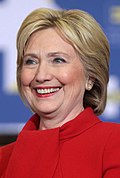Analysis
As he had in other caucus states and among other largely white, rural electorates in the farm belt, Sanders won a large victory over Hillary Clinton in North Dakota. Sanders won in the cities of Fargo, Bismarck, and Grand Forks where he had campaigned heavily, and he also swept most other rural, conservative counties in the state. The caucus did not require participants to register before voting due to the state's small population. [5]
Analyst for the New York Times Nate Cohn summarized the results: "A Sanders win in North Dakota isn’t much of a surprise. It’s a caucus state and it’s a small state, worth just 18 delegates. He’s won every caucus since Nevada." [6]
This page is based on this
Wikipedia article Text is available under the
CC BY-SA 4.0 license; additional terms may apply.
Images, videos and audio are available under their respective licenses.



